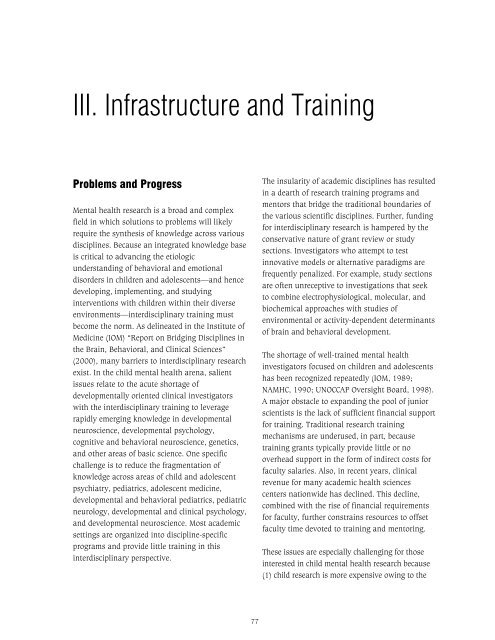Research on Child and Adolescent Mental Health
Research on Child and Adolescent Mental Health
Research on Child and Adolescent Mental Health
Create successful ePaper yourself
Turn your PDF publications into a flip-book with our unique Google optimized e-Paper software.
III. Infrastructure <strong>and</strong> Training<br />
Problems <strong>and</strong> Progress<br />
<strong>Mental</strong> health research is a broad <strong>and</strong> complex<br />
field in which soluti<strong>on</strong>s to problems will likely<br />
require the synthesis of knowledge across various<br />
disciplines. Because an integrated knowledge base<br />
is critical to advancing the etiologic<br />
underst<strong>and</strong>ing of behavioral <strong>and</strong> emoti<strong>on</strong>al<br />
disorders in children <strong>and</strong> adolescents—<strong>and</strong> hence<br />
developing, implementing, <strong>and</strong> studying<br />
interventi<strong>on</strong>s with children within their diverse<br />
envir<strong>on</strong>ments—interdisciplinary training must<br />
become the norm. As delineated in the Institute of<br />
Medicine (IOM) “Report <strong>on</strong> Bridging Disciplines in<br />
the Brain, Behavioral, <strong>and</strong> Clinical Sciences”<br />
(2000), many barriers to interdisciplinary research<br />
exist. In the child mental health arena, salient<br />
issues relate to the acute shortage of<br />
developmentally oriented clinical investigators<br />
with the interdisciplinary training to leverage<br />
rapidly emerging knowledge in developmental<br />
neuroscience, developmental psychology,<br />
cognitive <strong>and</strong> behavioral neuroscience, genetics,<br />
<strong>and</strong> other areas of basic science. One specific<br />
challenge is to reduce the fragmentati<strong>on</strong> of<br />
knowledge across areas of child <strong>and</strong> adolescent<br />
psychiatry, pediatrics, adolescent medicine,<br />
developmental <strong>and</strong> behavioral pediatrics, pediatric<br />
neurology, developmental <strong>and</strong> clinical psychology,<br />
<strong>and</strong> developmental neuroscience. Most academic<br />
settings are organized into discipline-specific<br />
programs <strong>and</strong> provide little training in this<br />
interdisciplinary perspective.<br />
The insularity of academic disciplines has resulted<br />
in a dearth of research training programs <strong>and</strong><br />
mentors that bridge the traditi<strong>on</strong>al boundaries of<br />
the various scientific disciplines. Further, funding<br />
for interdisciplinary research is hampered by the<br />
c<strong>on</strong>servative nature of grant review or study<br />
secti<strong>on</strong>s. Investigators who attempt to test<br />
innovative models or alternative paradigms are<br />
frequently penalized. For example, study secti<strong>on</strong>s<br />
are often unreceptive to investigati<strong>on</strong>s that seek<br />
to combine electrophysiological, molecular, <strong>and</strong><br />
biochemical approaches with studies of<br />
envir<strong>on</strong>mental or activity-dependent determinants<br />
of brain <strong>and</strong> behavioral development.<br />
The shortage of well-trained mental health<br />
investigators focused <strong>on</strong> children <strong>and</strong> adolescents<br />
has been recognized repeatedly (IOM, 1989;<br />
NAMHC, 1990; UNOCCAP Oversight Board, 1998).<br />
A major obstacle to exp<strong>and</strong>ing the pool of junior<br />
scientists is the lack of sufficient financial support<br />
for training. Traditi<strong>on</strong>al research training<br />
mechanisms are underused, in part, because<br />
training grants typically provide little or no<br />
overhead support in the form of indirect costs for<br />
faculty salaries. Also, in recent years, clinical<br />
revenue for many academic health sciences<br />
centers nati<strong>on</strong>wide has declined. This decline,<br />
combined with the rise of financial requirements<br />
for faculty, further c<strong>on</strong>strains resources to offset<br />
faculty time devoted to training <strong>and</strong> mentoring.<br />
These issues are especially challenging for those<br />
interested in child mental health research because<br />
(1) child research is more expensive owing to the<br />
77

















